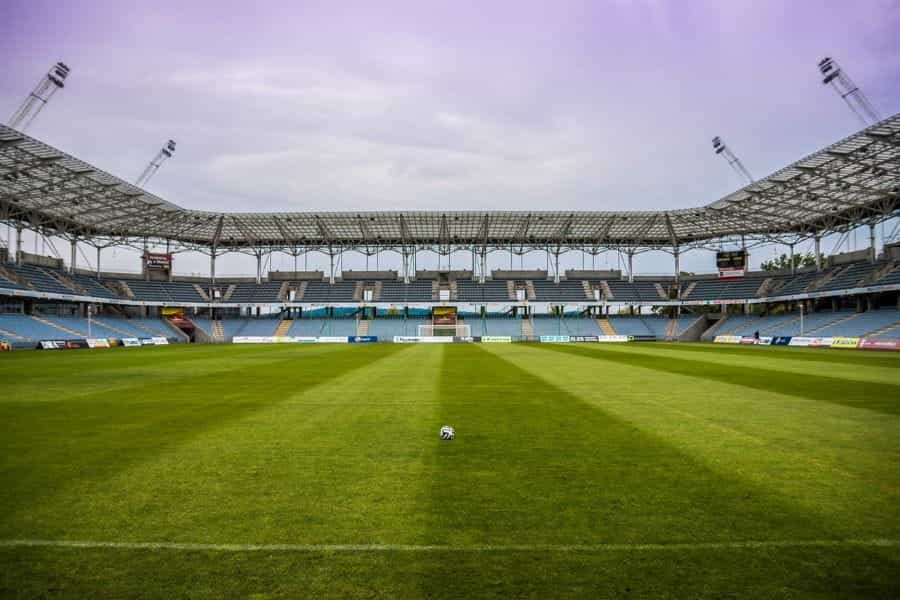English Football Fans Return to Matches
After nine months, English football fans have finally been allowed to return to matches. The country’s lockdown has come to an end, and spectators can now return to sports events for the first time since March. However, sports fans in England’s tier three areas, as well as in Wales, will have to wait a little longer.

For the first time in nine months, football clubs in England will not have to play to empty stadiums. ©Pixabay/Pexels
Positive News for Clubs
As England’s second lockdown ended on December 2nd, the country entered a new phase in its battle against the coronavirus pandemic. The country has been divided into three tier systems, each with specific rules on what is and is not allowed. While there has been dismay for those who have been told that they cannot reopen their businesses, there has been good news for sports fans.
People in tiers one and two are now allowed to attend sports events. In tier one areas, up to 4,000 fans are permitted, while in tier two areas that number has been lowered to 2,000. Fans have largely been absent from sporting events since March 13th, aside from some pilot events. But, on December 2nd six EFL games welcomes back around 10,000 supporters.
The first football club to play to fans was Carlisle, which played against Salford City at 7pm. 45 minutes later, another five fixtures kicked off at Cambridge, Charlton, Luton, Shrewsbury and Wycombe. Fans were allowed to sing, but social distancing was a must. There were a few other rules for those attending, such as not to approach players, not to touch the ball and to wear facemasks on their way to their seats.
The matches are also only open to home fans for the time being. That means that away fans are not allowed to travel to attend matches. Unlike in the rest of England, attendees will be allowed to buy an alcoholic drink without purchasing a “substantial meal”. Fans have been encouraged to arrive early, not to rush to the toilets during peak times and to avoid unnecessary movement.
It’s been a long time coming for fans, and a cause for celebration. The reaction has largely been positive with the first spectators to attend praising clubs for their organization. Cambridge United fan Roger Watson described the atmosphere on Wednesday’s match to BBC reporters, saying:
“The organisation by the club was first class. There were clear directions to your allocated seat, no issues with social distancing and regular announcements reminding you of the need to socially distance. At the end of the match the fans were told when to leave so again avoiding a build up of fans anywhere. Face masks were compulsory but no-one objected to this. On the whole it seemed a safe environment.”
However, some supporters have expressed concern over whether it is too soon lessen restrictions. According to a BBC Sport poll, there is mixed opinion amongst fans over whether spectators should have been allowed to return before the COVID-19 vaccine is made available. The Savanta ComRes poll found that out of 2,100 football supporters, 52% said that fans should be allowed to attend matches before a vaccine, while 45% disagreed. On December 2nd the UK became the first country in the world to approve the Pfizer/BioNTech coronavirus vaccine, and is now rapidly setting out facilities to start offering it to the public.
It’s not just professional sports that have received good news this week. Some amateur sports have been told they too will be able to resume play. Grassroots sports were forced to press pause during England’s latest lockdown, but with some restrictions now lifted, teams have been given the go ahead to play. The FA said that organized grassroots football can be permitted in all three of England’s tiers, with safety measures in place.
Welsh Sports Fans Must Wait
Sports fans in Wales will have to wait a little longer to watch their favorite clubs play in person. The Welsh government has said that it is not likely to allow the return of spectators until next year. From December 4th, the country will have a new set of rules to stick to, which will see all cafes, pubs and restaurants close at 6pm and prohibited from serving alcohol. After 6pm, these businesses will only be allowed to offer takeaway services.
Indoor entertainment venues, such as cinemas and bowling alleys, will also be closed. However, outdoor visitor attractions will be allowed to stay open. These restrictions have been put in place to try and curb the R rate, as case numbers have been seen to rise again. The rate of infection is now at approximately the same level as it was before the country went into its firebreak lockdown.
The restrictions in Wales are to be reviewed every three weeks, from December 17. To alleviate what is set to be a tough period for retail and hospitality, the Welsh government has bookmarked £350 million of funding to support businesses. With businesses in some sectors being forced to close, it is therefore unlikely that restrictions in another will be loosened any time soon.
It has been announced that the Coral Welsh Grand National, which takes place on December 27th, will take place behind closed doors. Despite punters being allowed to attend races in England, Wales’ most important event of the racing calendar will have to take place without fans. It will be aired live on ITV Racing and Sky Sports Racing.
The race takes place at Chepstow, which lies close to the border with England and across the river Severn from Bristol. In a press release published by Chepstow Racecourse, race officials revealed that they are in talks with the government about the situation, stating:
“It had been hoped we could welcome spectators at Chepstow and Ffos Las following Boris Johnson’s decision to allow customers to attend elite sport in Tier 1 and 2 regions in England from December 2nd. Unfortunately this is not the case and discussions with Welsh Government are continuing. We hope for a positive outcome.”
In rugby, Wales boss Wayne Pivac has said that he thinks that it may be too late to allow fans to watch the Six Nations in person. There has been discussion around delaying the tournament. Pivac highlighted that Wales’ February matches against England and Ireland would cost the WRU £13.5 million if played behind closed doors.
However, as there is still uncertainty as to when it will be possible to allow fans back in the stands, rescheduling events remains problematic and could lead to fixture congestion. For now, Pivac says that the Six Nations are so close that any big changes seem unlikely.



